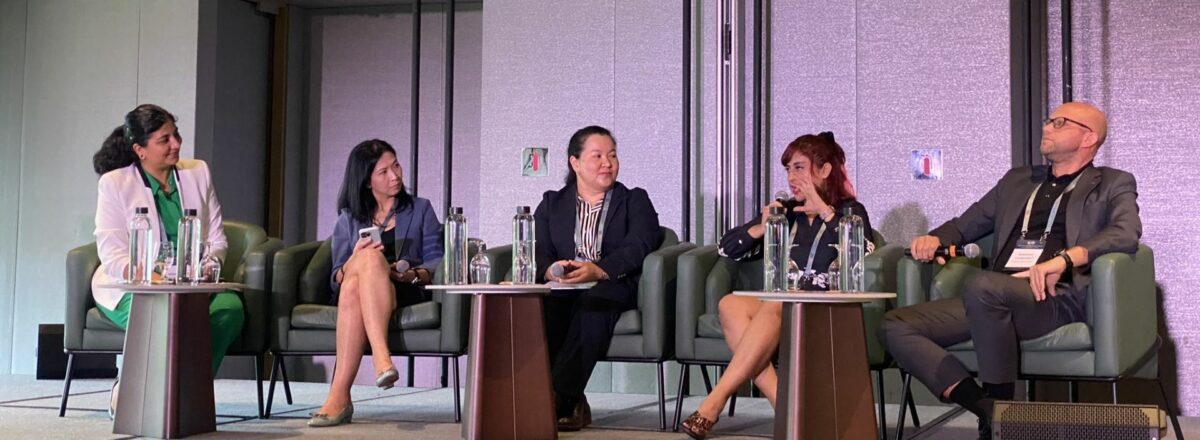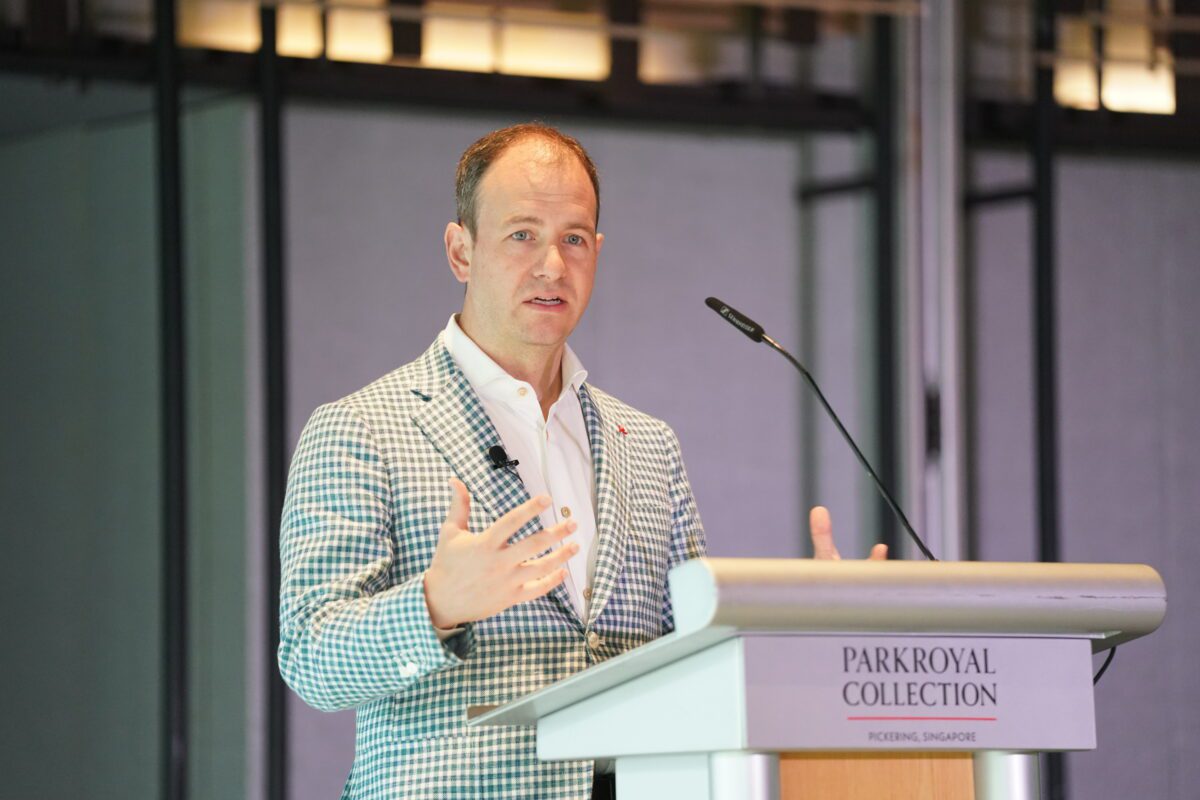The Carbon Market Institute’s 2nd Singapore Carbon Market & Investor Forum closed following a showcase of frustrations, challenges and opportunities as markets across Asia mark a fundamental shift towards compliance foundations.
“In the last 12 months there has been a profound shift towards carbon compliance and pricing as countries grapple with the European carbon border adjustment mechanism but also the need to amplify decarbonisation investment signals,” said John Connor, Carbon Market Institute CEO.
“In the last year Singapore’s carbon tax increased fivefold from S$5 to S$25, as three emission trading schemes are in development and five are under consideration joining the 17 national and sub-national carbon pricing schemes compliance regimes.”
“The forum explored how these schemes might be better linked over time but also the steps nations would need to take with registries, monitoring, reporting and verification of decarbonisation and carbon credits.”
The final day commenced with a keynote from Laconic CEO Andrew J Gilmour who outlined the sophistication needed in financial intermediation and data to facilitate the dramatic upscaling in investment required. Gilmore noted the significant transaction friction costs in the current voluntary carbon market and outlined some reforms to decrease these, noting improved functions were “battle hardened” in other financial securities markets.
Various speakers highlighted that between US$2 to 7 trillion per year would be required for developing nations transition to net zero emissions, noting that carbon markets can add a substantial if not significant part of those investments.
In her keynote address, Katia Daude Gonçalves, regional country manager for the International Finance Corporation, outlined various blended finance models and noted that 14% of Asia’s GDP was exposed to climate risks, a rate four times the global average.
As we look towards the next twelve months in the space, ASEAN and other leadership opportunities for the region must maintain the momentum already established, while also sending strong decarbonisation signals to industry. Throughout the program, speakers repeatedly emphasised the importance of harmonising strong government policy signals with private sector actions. Ongoing sophistication is required to ensure that investments in technology and projects continue to scale as needed.
Recognising the inextricable linkages between private and public sector investments, the final plenary session emphasised the role of the voluntary carbon market in continuing to drive greater ambition in corporate and governmental climate change plans.
“The bridge to a regulatory framework is the voluntary market,” Senior Fellow with Mitsui & Co. Global Strategic Studies Institute, Takashi Hongo said.
Bloomberg NEF’s Head of APAC Gas, Power, Carbon Markets, Fauziah Marzuki commented on the continued value of carbon markets as a tool to accelerate emissions reduction trajectories: “We’re moving in a way where we know how to decarbonise power, but when it comes to the other sectors, that’s where the carbon market is a very valuable tool for channelling finance into decarbonisation.”
Other highlights from the event are outlined below:
Thematic Highlights:
- Policy-focused plenary and workshop sessions in the morning of Day One provided the opportunity for a bird’s eye view of the latest climate policy developments across the Asia Pacific region, with a particular focus on emerging and evolving carbon pricing mechanisms.
“We don’t have time to be establishing principles at a national level and then come together to establish the synergies for international cooperation. We need to be working together in a coordinated way… on a without prejudice basis.” – Emily Follet, Deputy High Commissioner, Australian High Commission, Singapore
“The Government is very supporting of economic growth and climate together. So that means green growth.” – Charis Yeap, Green Finance Lead, British High Commission
“Aim to support companies to understand how to source, and how to use the high-quality credits eligible under the Singaporean Government’s eligibility criteria.” – Vicki Yong, Team Lead & Assistant Director, Singapore Ministry of Industry
“There are minimum requirements in the Article 6.2 agreements, but what we are seeing is that governments are going above and beyond those minimum requirements to ensure that there are strong environmental and social outcomes from those projects.” – Emily Gerrard, Principal Lawyer, Comhar Group
“We see carbon markets as complementary… as the ecosystem grows that can only be a good thing for unlocking greater financing to invest in mitigation outcomes.” – Yi Jun Mock, Singapore Prime Minister’s Office
- The Nature Keynote and pursuant plenary highlighted how nature represents an undeniable opportunity for corporates to enhance their socially responsible investment portfolios. Of particular importance: ongoing investment in high-quality nature-based projects that deliver verifiable environmental, social and economic benefits to the communities that host projects.
“We’re looking down the barrel of twin crises, and nature-based solutions are really in the sweet spot, providing a solution for both biodiversity and climate challenges.” – Janet Hallows, Director of Climate Change Programs and Nature-based Climate Solutions, Carbon Market Institute
“Purchasing high-quality carbon credits and signaling the value of these projects by paying a higher price, will help create the needed incentive to build the pipeline of high integrity projects in Asia Pacific.” – Will McGoldrick, Regional Managing Director, Asia Pacific, The Nature Conservancy
“We need a viable market mechanism to drive private sector players to drive and mobilise finance into natures, and to establish an explicit cost on the action of nature destruction.” – Ling Min Hoon, Director, GenZero
“Let’s admit that nature is indeed a complex problem, but equally it’s part of the nature of businesses to address complex problems. This is an opportunity for businesses and finance institutions to be part of the solution, and no longer part of the problem.” – Pallavi Kalita, Asia Lead, Business for Nature
- Industry-focused afternoon sessions of Day One highlighted the role of pricing frameworks such as carbon border adjustment mechanisms, and emissions trading schemes in supporting heavy industry investment in direct decarbonisation. The role of carbon markets in channelling finance into innovative new technologies and solutions and placing an explicit price on carbon was repeatedly highlighted as a key requirement.
“If you pollute, you have to pay for it and we need to move to having that as a standard precedent as soon as possible.” – Chris Halliwell, Co-Founder & CEO, CORE Markets
“Everywhere, if you see that CCUS is booming, it’s because of the government support for example through high emissions trading scheme prices.” – Sohini Chatterjee, Lead-CCUS, Rystad
“It’s very important for governments to consider how they can help industry and accelerate these processes.” – Minerva Lim, Maritime Port Authority
- Integrity continues to remain a marker of quality for investment decisions in the carbon market. Despite the development of frameworks such as the IC-VCM and the VCMI, a single definition of integrity continues to remain elusive.
“Integrity in itself is not a new concept or a new ask. What has matured over time is a question of what actually constitutes a high-quality credit or project.” – Nadia Nair, ACT Commodities
“The IC-VCM and the VCMI provide a focus for what integrity means. It provides a common language, which is something quite needed in a market marred by complexity.” – Duncan van Bergen, Co-founder, Calyx Global
- Although the market is not perfect, it is increasingly evolving at pace with shifting methodology, governance and end use requirements. Investment needs to continue to grow to support the growth of projects that both protect existing environments of significance, and enhance the scale down of atmospheric emissions. Additionally, as a tool the market provides a degree of certainty for investors through the creation of a formal framework.
“We have a sufficient amount of experience, and knowledge, to demonstrate that carbon finance, if structured properly, can scale decarbonisation activity.” – Virender Duggal, Asian Development Bank
“We know that current ambition is not near to the ambition required to achieve the Paris Agreement targets. Carbon markets are just one tool to help raise the ambition of governments, and if markets aren’t raising ambition then they are not fulfilling their purpose.” – Björn Fonden, International Policy Advisor, IETA
“When we see the scale of the climate finance gap, we can’t dismiss any tool that might help close the gap. We need to mobilise mass finance, and that includes private sector finance. This is where carbon markets come in.” – Nasim Pour, Carbon Removals Lead, World Economic Forum
“As an exchange, our objective is to help the market grow. We do that by defining the components of the market that we need to see to make it successful. When we look at the carbon market…. We need natural supply and demand, we need robustness in an underlying secondary market, and you need a really robust regulatory framework to take some of that uncertainty away.” – Daniel Sinclaire, ASX
“There is pressure for stricter capital management on the company side, and for boards and management to make longer term decisions today about longer term capital decisions that may or may not pay off, but are essential for the future.” – Heidi Yip, Blackrock
- Harmonisation and interoperability of sub-national, national and regional policy frameworks; new technologies for MRV, and the platforms that support the data; standards around use of credits and the development of projects; and assimilation of public and private finance flows are key to growing the scale of the market.
“Whether it’s the voluntary carbon market or Paris-backed market access, harmonisation and understanding the national and the subnational will be increasingly important to support private investment.” – Emily Gerrard, Principal Lawyer, Comhar Group
“Each quantum of carbon, or each quantum of data that represents the carbon… is not in and off itself a quantifiable financial instrument. Unless structured as a financial instrument, it cannot be traded as a commodity.” – Andrew J. Gilmour, Co-Founder & CEO, Laconic
“Partnerships with the private sector will be crucial to scale these investments. However, private investors looking at these emerging markets perceive a lot of risk.” – Katia Daude Gonçalves, Country Lead, IFC
“What we need to think about is a framework that allows the mutual recognition of these different domestic frameworks.” – Fauziah Marzuki, Bloomberg NEF
Forum Media Releases:
- Blended finance solutions possible with the right policy mandate
- Compliance carbon pricing schemes key to incentivising private sector investment in decarbonisation
- Environment NGO leader calls on investors to remain engaged with high integrity carbon and nature markets
- APAC Region championing collaboration to scale investments in climate and nature solutions
About the Forum
The Singapore Carbon Market & Investor Forum is the Asia Pacific Region’s premier decarbonisation and market-solutions focused event. In its inaugural year, the Forum brought together over 300 senior delegates, with a mix of government and private sector representatives present. The Forum brings together actors from across the broader Asia Pacific Region, with an emphasis on knowledge sharing for capacity building. The high profile of speakers and delegates continues to attest to the importance of fostering international linkages to support a net zero trajectory.
The full event program is accessible here.



